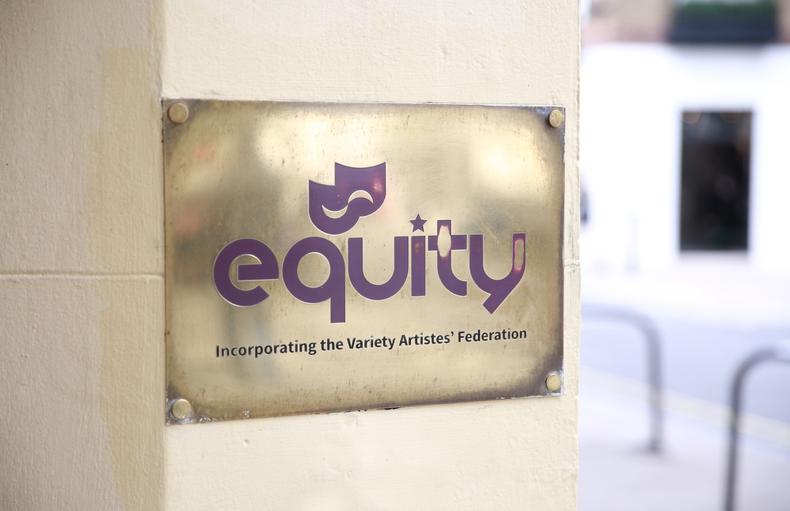
Getting a union card has long been considered a rite of passage in the industry. For theater actors and stage managers in the United States, becoming a member of Actors’ Equity Association signals professionalism. And due to recent policy changes, it’s now easier to join than ever. Here’s everything you need to know.
JUMP TO

Patrick Shutterstock/Shutterstock
Actors’ Equity Association is a labor union representing stage actors and stage managers in the U.S. It enforces and negotiates workplace standards for theater professionals through collective bargaining agreements with producers and theaters. The country’s other major actors’ union is SAG-AFTRA, which represents performers in film and television.

Kozlik/Shutterstock
For performers, the first step in the process is the audition, in which they must distinguish themselves from their peers. Thanks to the high demand for a limited number of roles in any given production, producers and employers have the upper hand, giving them leverage over actors.
Since a producer’s mission is to make as much money as possible—showbiz is a business, after all—they tend to keep production costs as low as possible. This can mean uneven pay scales, reduced rehearsal weeks, and offstage budget cuts.
Unions give actors, who are in a vulnerable position, the right to expect certain professional standards thanks to collective bargaining agreements. These involve negotiations between producers and Equity to come to an agreement on a set of standards for union members.

Ground Picture/Shutterstock
Consistency: Based on the size of the theater and the market of the show, Equity sets a bar for pay rates, workplace amenities, and professional standards for producers and actors alike. Each show elects a union performer or stage manager to serve as a deputy who relays any concerns to Equity.
Health care: Members may qualify for health insurance from the Equity-League Benefits Fund, which is operated by union trustees and employers. Equity actors won’t automatically receive coverage, however; eligibility depends on specific stipulations relating to how many consecutive work weeks they’re employed.
Workshops and studio resources: Union actors can take advantage of benefits like studio rentals for taping auditions (if you live in a city with a regional union office), plus access to workshops on financial literacy, industry trends, and best practices.
Auditions: One of the chief perks of union membership is getting preferential treatment in the audition process. Set Equity tryout slots allow actors an added degree of predictability.
While a union card doesn’t guarantee that you’ll land a gig, it will ensure that you at least get seen by casting directors. Even if a certain role isn’t right for you, the CD might keep you in mind for a future project; after all, the industry is all about networking.

Andrey Bayda/Shutterstock
The answer to this question depends on where you live. Here are some tips by region:
New York City
Gothamites should strongly consider joining Equity. NYC, which is in the union’s Eastern Region, is where 63% of members live. Equity’s contract with the Broadway League, which covers sit-down shows on the Great White Way as well as touring productions, is its largest provider of work weeks (Equity’s preferred metric).
Chicago
Since the Windy City’s theater scene is more focused on storefront productions and nonunion houses, having an Equity card may prevent you from getting cast. Particularly if you’re an early career actor in Chicago, it might be better to hold off on applying; casting directors for union theaters often scout talent at reputable, innovative storefront productions.
Los Angeles
Since L.A. is largely a film and TV town, the answer here is maybe. Depending on what medium you’re working in, it may be a better bet to join SAG-AFTRA.
Other theater hubs
If you live in Boston, Chicago, Washington, D.C., Philadelphia, San Francisco, or Minneapolis, you may or may not want to apply for Equity membership depending on your particular circumstances. If you’re offered a role at a major regional house that’s a member of the League of Resident Theatres (LORT) then it’s likely worth it to try for an Equity spot. The union’s contract with LORT comprises the second-largest amount of work weeks in the country.
For Orlando residents, it makes sense to join up if you work at Disney World, as the park has a standing agreement with Equity.

Prostock-studio/Shutterstock
Though going through a professional training program can help you hone your technique and build a professional network, there’s no bar exam for theater performance. You don’t need a particular degree to join Equity, and it’s certainly not a necessity for landing a Broadway gig—or a job at any theater, for that matter. If you work hard, treat people well, and demonstrate that you’re a good fit for roles, you can work toward union status.

Christian Bertrand/Shutterstock
Theaters struggling in the wake of COVID-19: If you live in New York City or another theater hub with many LORT houses, it’s worth considering union membership. In smaller markets, however, you may want to hold off; many theaters have been slow to recover from the effects of the pandemic, which means they often can’t afford to hire union actors.
Financial commitments and constraints: Equity membership requires making regular payments for dues and fees. Very few stage or screen performers in the U.S. can make a living on acting alone.
According to Equity’s most recent annual report from the 2020–21 season, the majority of its members make below $10,000 yearly from union contracts, with a majority earning less than $2,500 annually.
For most actors, union membership doesn’t equate to a sustainable salary; so if you live outside of an Equity hot zone, ask yourself what’s most important to you. Either way, you’ll likely still have to maintain a side hustle.
Becoming a member might not be worth it: Last year, Equity received negative press when Patti LuPone revealed that she’d resigned from the union, calling it a “circus.” The Broadway legend said that “the best-kept secret is that you can perform without being a member of Equity. Nobody knows that, so I don’t use their services; so, I’m not a member of Equity anymore.” She also referenced a clause that allows Broadway producers to use special guest contracts—a privilege only available to big-name stars like LuPone.

Fer Gregory/Shutterstock
For many years, there were only two ways to join the union:
- Get cast at a theater that uses union contracts.
- The Equity Membership Candidate Program, which the union is phasing out; it will stop accepting new applicants after May 1, 2023. Under this policy, actors can opt in to Equity candidacy if they’re hired for a nonunion gig at a theater that offers union contracts. You need to be employed for at least 50 work weeks to get your card, earning an “Equity point” each week.
In July 2020, the union made a significant change to this policy: Equity candidates now only need to earn 25 points to join the union. Then, in July 2021, Equity made another change: the Open Access policy, which, compared to the status quo for union admission, was radically simple: If an actor or stage manager can prove that they’ve worked at a professional theater, they can apply for membership.
In February 2023, the union announced that it will be phasing out the Membership Candidacy Program altogether, and Open Access will be the modus operandi for Equity status going forward. “Open Access is about providing a pathway to Equity membership that doesn’t depend on our employers or on our industry’s hiring practices,” said Equity president Kate Shindle in a statement. “Open Access has moved that decision into the hands of actors and stage managers themselves.”
Equity in Actors’ Equity: The union says that these changes arose as part of an attempt to diversify its membership. In its most recent annual report, there is essentially equal membership between female and male–identifying actors. However, a majority of the union identified as white/European American.
While the industry was on pause during lockdown, theater professionals took time to reflect upon and challenge the status quo. As antiracist movements like Black Lives Matter came to the fore, nonwhite stage workers began to shine a light on inequality in the industry. We See You, White American Theater, a collective formed by BIPOC stage professionals, outlined a set of principles that, if institutions followed them, would help reduce inequality in the industry. The manifesto also called on theater unions to improve working conditions for nonwhite employees.
When speaking on the impacts of the Open Access policy, Shindle stated: “In the 18 months since we launched, we’ve seen a significant increase in the diversity of our new members…. Since the launch of Open Access, roughly 38% of members joining through the initiative who self-identified were people of color.”
Financial straits: There’s another component to the Open Access program that the union is less likely to acknowledge: Equity’s source of income is dues and fees, and per its most recent annual report for the 2020–21 season, new union membership dropped 87% due to the pandemic. Since then, Equity has faced the challenge of theater closures and encroachment from SAG-AFTRA.
The two unions butted heads over whether digital or recorded theatrical productions were under Equity or the SAG-AFTRA jurisdiction. The latter, which has a much larger reach and budget, signaled that it was ready to swoop in should digital theater become the norm.















